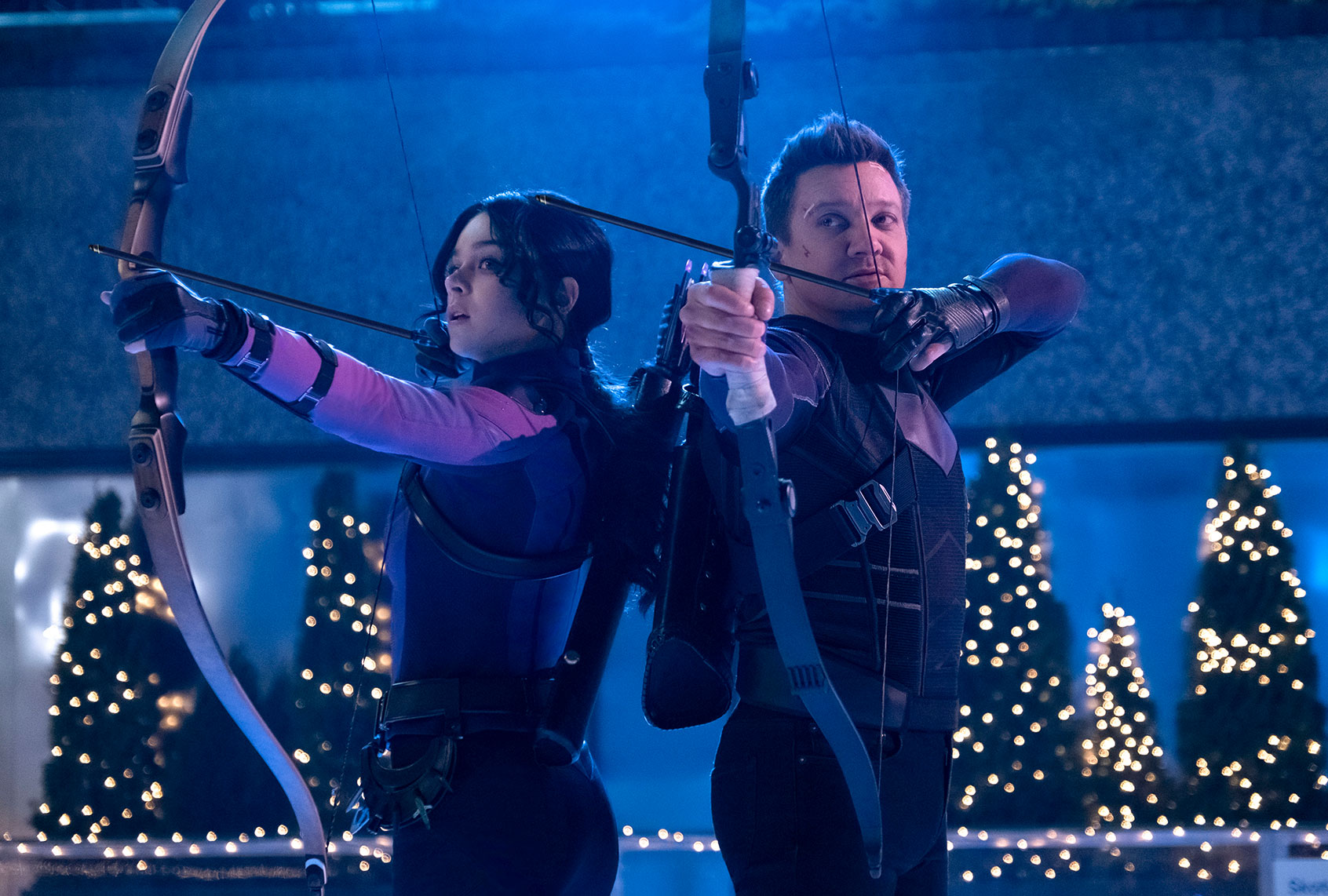I fell asleep the first time we watched “Black Widow,” the 2021 Marvel film starring Scarlett Johansson. In my defense, it had been a long week. “What happened to Yelena?” I asked when I woke on the couch. My son, who had been glued to every scene, said frankly: “I honestly do not know.”
In Wednesday’s episode of the Disney+ show “Hawkeye” we know. And it’s not good.
RELATED: What “Hawkeye” gets right about deafness – and what it glosses over
Yelena (Florence Pugh) the assassin sister of Black Widow Natasha was blipped, part of half of the world that disappeared when Thanos snapped his fingers in Marvel lore. Just as suddenly, but actually years later, Yelena reappears, indicated with gasping spectacle early in the episode. Wisely, this opening is set from Yelena’s point of view. She’s gone to an opulent house to try to rescue the contract killer there who she believes is still under the Red Room’s control — Yelena’s mission now is to free other Black Widows.
But in the bathroom, the water in her hands turns to dust. The wallpaper changes. Outside in the living room, there’s a strange man, different furniture, a child.
Before she went into the bathroom, Yelena and a fellow Black Widow vigilante joke about what they will do when all the Black Widows are free: “You and Natasha will be reunited and live your ‘Sex and the City‘ fantasy in New York.” It will stay that, a fantasy — and Yelena will only go to New York for the first time later, alone, to try to kill Clint Barton (Jeremey Renner), the man she believes is responsible for her sister’s death.
Because Clint got his family back after the blip. Yelena never will.
Importantly, Yelena also never got to say goodbye. Natasha’s death happened when Yelena was gone. Natasha never got to say goodbye to her, either.
So much of “Hawkeye” is about separation. Clint is separated from his family at Christmas, the most allegedly together time of the year. Kate Bishop (Hailee Steinfeld) is separated from the life she wants, her childhood dream of fighting alongside Barton’s Hawkeye, a dream so close and yet so far away. Kate also drifts further away from her family, as the mother she thought she knew is revealed to be involved in increasingly criminal activities.
Mob leader Maya, the glowing Alaqua Cox, is separated from the world by ableism — her deafness keeps her apart.
As Clint meets Maya to try and dissuade her from avenging her murdered father, a revenge path he knows well as the Ronin, “Hawkeye” once again suffers from not having deaf writers on staff. The show assumes that Maya would not notice the multiple members of her gang being incapacitated and dragged away. Speaking as a deaf person who’s had to be hyperaware my whole life: she would notice. Her fighter character wouldn’t be ill-prepared enough to run out of bullets, either.
Clint suddenly has gotten better at sign language, and Maya at the near-impossible task of lip-reading, and the two can magically understand each other. “You and I, we’re the same.” Clint says. “We’re weapons. But when you’re filled with rage, it makes you blind.”
It’s frustrating that show that did so well with deaf characters in an earlier episode makes an ableist blunder in this one.
This scene is also a missed opportunity for the communication mistakes that define “Hawkeye.” The entire show hinges on misunderstandings that spiral out of control: the domino effect of Natasha’s death, the mistaken identity of Kate as the Ronin, even the Ronin himself.
What will save the characters may be friendship. The centerpiece of this episode is a lovely and funny moment with Kate and Yelena. Yelena has broken into Kate’s fire-ravaged apartment, made boxed mac and cheese (“My daddy says it’s good for you”), and in a scene reminiscent of “Killing Eve” when agent Eve sits down with the charming killer Villanelle, implores Kate to have dinner with her.
Pugh is hilarious, deadpan and believable as Yelena, a role she seems to disappear into, rappelling out the window like a Russian Punky Brewster. And Pugh and Steinfeld have a real chemistry, perhaps even more so than the buddy-buddy-ness of Steinfeld and Renner. In a genre where women are often pitted against each other — Maya fighting Kate, Yelena fighting Maya — it’s refreshing to see two young woman characters banter. “Thank you for the girls’ night, truly,” Yelena says as she takes her window exit. Their connection feels as unlikely as it does inevitable.
Want a daily wrap-up of all the news and commentary Salon has to offer? Subscribe to our morning newsletter, Crash Course.
“Hawkeye” is also about saying goodbye to the life you thought you knew. As Kate can’t return to her ruined apartment, so too she can’t go back to being just a college archer with a really rich mom. Not after knowing what she knows now. And though Clint has left the bloodthirsty Ronin behind and is back to being a family man, his actions still resonate, ringing through Yelena, who says, “The trail of blood that follows him, it could wrap around the entire world.”
Yelena and the Ronin have more in common than they realize. Yelena never got the chance to grieve. Clint didn’t allow himself to, instead becoming the Ronin. Characters never get the opportunity to speak their truth, or like Maya, are not understood when they do.
Which is something that may resonate especially now as we approach year three of the pandemic. Many viewers have commented on the setting of “Hawkeye” at Christmastime, which gives it a kind of “Die Hard” joviality. And loneliness. And so perhaps Hawkeye is a pandemic fable too, about how some of us never get to say goodbye or grieve, about loss we can’t even count or imagine how it will live in us forever, not yet.
More stories like this:

